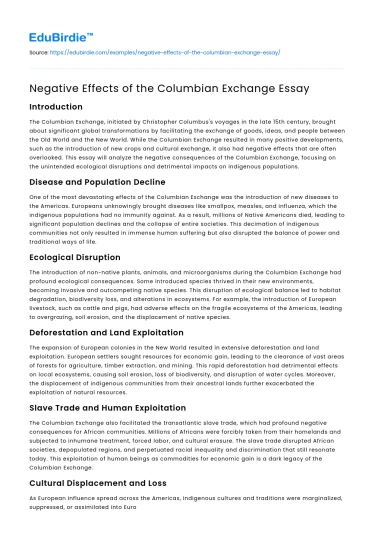Introduction
The Columbian Exchange, initiated by Christopher Columbus's voyages in the late 15th century, brought about significant global transformations by facilitating the exchange of goods, ideas, and people between the Old World and the New World. While the Columbian Exchange resulted in many positive developments, such as the introduction of new crops and cultural exchange, it also had negative effects that are often overlooked. This essay will analyze the negative consequences of the Columbian Exchange, focusing on the unintended ecological disruptions and detrimental impacts on indigenous populations.
Disease and Population Decline
One of the most devastating effects of the Columbian Exchange was the introduction of new diseases to the Americas. Europeans unknowingly brought diseases like smallpox, measles, and influenza, which the indigenous populations had no immunity against. As a result, millions of Native Americans died, leading to significant population declines and the collapse of entire societies. This decimation of indigenous communities not only resulted in immense human suffering but also disrupted the balance of power and traditional ways of life.
Save your time!
We can take care of your essay
- Proper editing and formatting
- Free revision, title page, and bibliography
- Flexible prices and money-back guarantee
Ecological Disruption
The introduction of non-native plants, animals, and microorganisms during the Columbian Exchange had profound ecological consequences. Some introduced species thrived in their new environments, becoming invasive and outcompeting native species. This disruption of ecological balance led to habitat degradation, biodiversity loss, and alterations in ecosystems. For example, the introduction of European livestock, such as cattle and pigs, had adverse effects on the fragile ecosystems of the Americas, leading to overgrazing, soil erosion, and the displacement of native species.
Deforestation and Land Exploitation
The expansion of European colonies in the New World resulted in extensive deforestation and land exploitation. European settlers sought resources for economic gain, leading to the clearance of vast areas of forests for agriculture, timber extraction, and mining. This rapid deforestation had detrimental effects on local ecosystems, causing soil erosion, loss of biodiversity, and disruption of water cycles. Moreover, the displacement of indigenous communities from their ancestral lands further exacerbated the exploitation of natural resources.
Slave Trade and Human Exploitation
The Columbian Exchange also facilitated the transatlantic slave trade, which had profound negative consequences for African communities. Millions of Africans were forcibly taken from their homelands and subjected to inhumane treatment, forced labor, and cultural erasure. The slave trade disrupted African societies, depopulated regions, and perpetuated racial inequality and discrimination that still resonate today. This exploitation of human beings as commodities for economic gain is a dark legacy of the Columbian Exchange.
Cultural Displacement and Loss
As European influence spread across the Americas, indigenous cultures and traditions were marginalized, suppressed, or assimilated into European norms. The imposition of European customs, languages, and religious practices disrupted indigenous ways of life and resulted in the loss of cultural heritage and diversity. The negative effects of cultural displacement are still felt today, as indigenous communities continue to face the challenges of cultural erosion and the struggle to reclaim their identities and rights.
Conclusion
While the Columbian Exchange brought about significant advancements and cultural exchange, it also had profound negative effects on both ecosystems and human societies. The introduction of diseases, ecological disruption, deforestation, slave trade, and cultural displacement are just a few examples of the negative consequences that emerged from this exchange. Recognizing and understanding these impacts is crucial for acknowledging the historical injustices and for informing contemporary discussions about sustainable practices, cultural preservation, and social justice. By learning from the mistakes of the past, we can strive to build a more equitable and environmentally conscious future.






 Stuck on your essay?
Stuck on your essay?

